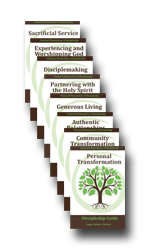 Discipleship is simply the activity of making lifelong apprentices of Jesus. Jesus was in the disciple-making business, so becoming like him means turning around and making disciples, too. And then those disciples would make more disciples who make disciples who make disciples—it should be a continual cycle.
Discipleship is simply the activity of making lifelong apprentices of Jesus. Jesus was in the disciple-making business, so becoming like him means turning around and making disciples, too. And then those disciples would make more disciples who make disciples who make disciples—it should be a continual cycle.
While that ideal perpetual motion machine of discipleship can be elusive, there are some simple ways to make discipleship a regular and expected part of Christian life.
Prioritize the Right Things
There are a couple of challenges with discipleship in church planting. One, you want to make sure that you are always empowering the ones you disciple to turn around and disciple others. Otherwise, you can create a bottleneck with you as the only person who knows how to teach others to be like Jesus. Eventually, you simply won’t have time to disciple everyone in your church. Whether it happens at 50 or 100 or 150 people, eventually you just won’t have time.
The other challenge I see is that church planters often feel this great pressure to get a Sunday worship service off the ground. There’s nothing wrong with that, per se. Even unchurched people in our culture think that the Sunday morning service is what makes a church a church, and it can be hard to grow without creating that Sunday expression of your community. The only problem is, if the focus all goes toward a Sunday worship service, church planters can end up planting a church—sometimes it will even grow to be a fairly large church—without making disciples.
It is possible to plant a church and not create disciples. But it’s hard to make disciples and not plant a church. If you are intentionally and faithfully discipling people, and empowering them to make more disciples, you get a church almost automatically.
[perfectpullquote align=”left” cite=”” link=”” color=”” class=”” size=””]It is possible to plant a church and not create disciples. But it’s hard to make disciples and not plant a church.[/perfectpullquote]
So my first word of advice to church planters is to clarify your goals. Ask yourself “what business am I in—what’s the most important thing here?”
Then, if you really want to be a disciple-making church, make sure you have enough time face-to-face with people, teaching and encouraging them to impart what they learn to their friends and neighbors. Give them easy, reproducible tools to help the discipleship process along.
Use the Right Tools
The Dimensions of Discipleship booklets that Multiply Vineyard published with Bob Logan are one of these easy tools. They’re cheap, and as my buddy Ross Nelson says, “If you can read it, you can lead it.” We’ve gone through them twice as a church with different emphases: first, personal transformation; and the second time , community transformation.
, community transformation.
Each time we preach a series following the booklets, and we make those booklets really available to everyone at a low cost. We encourage everyone who’s not in a small group to get in a small group so they can all go through the material that we’re talking about on the weekend. Lots of people do go through the material in
small groups, but some even just grab one or two other people and they’ll go through the guides together
There was a sort of an epiphany in my small group earlier this year around the Dimensions of Discipleship guides that was pretty cool. A guy that has been really growing in our church all of a sudden says, “Man, we could lead this, and you could go do other important things!”And I thought, “There you go! We’re hitting it. You can take this and lead others, and things could really take off.”
Now, that guy didn’t turn around and start a new small group, or anything like that. But it turned out that my schedule wasn’t going to allow me to be at small group more than one other time after that from June to August, and after that epiphany, the group was ready to go without me.
They did go through the guides on their own, and the group was actually bigger and more dynamic without me there. They grew to here they multiplied, and so now we have two groups.
Set Expectations
So the guides are really good tools. But I think the thing that has to go with them, to make them work, is the expectation that when people learn this stuff, that they are going to share it with others.
We have a woman who, up until now was almost completely unchurched. She’s coming to my small group now. One day in church, she handed me a letter asking for help, because she’s really struggling with depression and some other things. So my wife and I started meeting with her once a week for a couple of hours, and we’re using the Don Williams book, Start Here, because she had no foundation of Biblical knowledge at all. We’re reading a chapter a week and discussing it. On the third week in, I ask, “Is this helping?” And she says “Oh yes, I really like this, thank you.” So then I tell her, “I have an expectation that you will pass this on to somebody else. This isn’t just about you.”
At first when I brought it up, she had deer-in-the-headlights look. But we’ve been coaching her on what that might look like and how she could do actually use the same book to lead someone else.
I try to do this with everything I give people—marriage counseling, prayer, whatever. I tell them, “This isn’t just for you to feel better. It’s for you to give away to other people so they can also feel better.”
Planters, How Will You Do This?
I would really love to see some discussion among other pastors and church planters about how you are creating discipleship.
- How do you hold to the tension of putting energy into a Sunday worship expression without losing focus on discipleship?
- How do you encourage people to make disciples who make disciples? I would love to see third and fourth generations of disciples when I look at people I’ve worked with, but I don’t always see that. Do you?
 Joel and his wife Kristi had helped plant a non-denominational church and thought they would be there forever, until God called them to plant a Vineyard church in Lancaster, OH. That was 17 years ago. Now, in addition to being the lead pastor at the Lancaster Vineyard, Joel is an Area Leader and is part of the Small Town USA church planting partnership.
Joel and his wife Kristi had helped plant a non-denominational church and thought they would be there forever, until God called them to plant a Vineyard church in Lancaster, OH. That was 17 years ago. Now, in addition to being the lead pastor at the Lancaster Vineyard, Joel is an Area Leader and is part of the Small Town USA church planting partnership.





